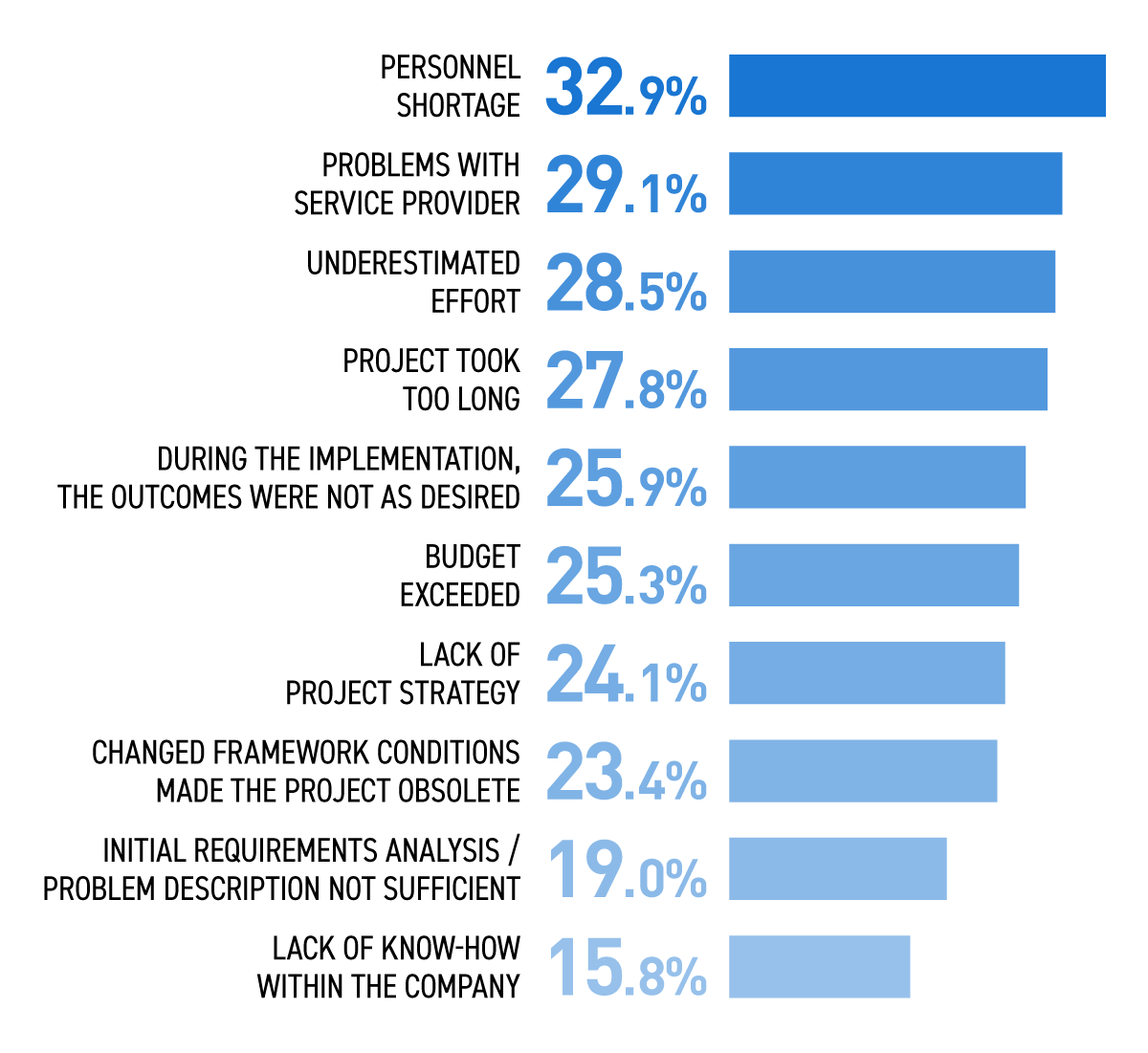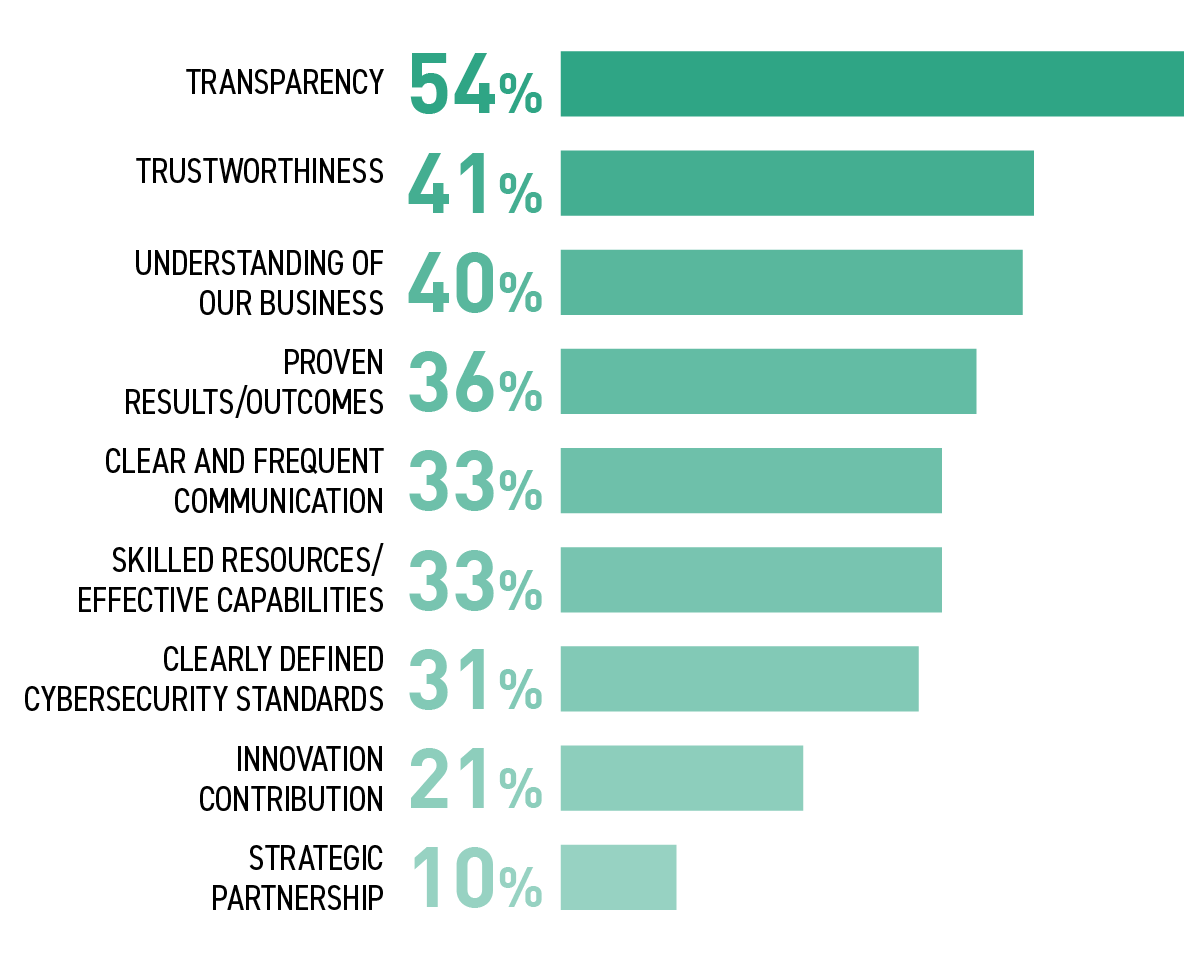
How to choose the right IT service provider
Table of Contents
Finding the perfect IT service provider is like finding a business soulmate. They bring specialized skills, cost efficiency, and flexibility, allowing your team to concentrate on what they do best.
However, on the other hand, choosing an inappropriate IT partner could result in the failure of your digitization projects in the future.
As our survey of German B2B companies conducted jointly with ECC KÖLN last year showed, 80% of respondents have canceled or “put on hold” at least one IT project within the last five years. Overall, around 13% of the projects initiated were canceled at some point.
Figure 1: Reasons for discontinued digitization projects

Question: Why were your digitization projects canceled?
Info: Respondents whose digitization and IT projects were canceled within the last five years; Multiple answers possible.
Source: “B2B Commerce – Caught between economic stress test and digital efficiency”, ECC KÖLN & Striped Giraffe, April 2023
Unfortunately, the majority of companies (68%) admitted that the wide variety of service providers and complex selection process are often overwhelming.
So, how do you find the right IT service provider?
In this article, we will dive into the benefits of partnering with an IT service provider, explore the different types of providers, and guide you on how to research and evaluate potential partners. By the end, you will have the tools to make a confident decision and secure a partnership that drives your business forward.
Benefits of partnering with an IT service provider
Let’s take a detailed look at the key advantages and benefits of companies working with external IT partners and technology providers.
Access to expertise
Partnering with an IT service provider grants you access to specialized skills as well as industry knowledge. They can suggest the right solutions to solve your problems and meet your challenges. Here is how:
- Specialized skills: IT partners bring specialized skills that might be lacking in your in-house team.
- Industry knowledge: They have extensive experience both in yours and other industries and can apply best practices to your projects.
- Optimal technology recommendations: They can recommend the best and most efficient technologies to achieve your business goals.
Cost efficiency
Reducing overhead costs compared to maintaining an in-house team is a significant benefit. In particular, IT service providers help by:
- Lowering recruitment costs: Avoid the high costs associated with hiring and training new employees.
- Reducing infrastructure costs: Minimize the need for investing in expensive hardware and software.
Scalability and flexibility
IT service providers offer the ability to adapt to business growth and changing needs. They usually provide:
- Scalable resources: Quickly scale resources up or down based on your project requirements.
- Flexible solutions: Adapt solutions to meet your evolving business needs.
Quick response to issues
While your IT department may be overwhelmed with other tasks, an IT partner is contractually obligated to respond promptly. Benefits include:
- Guaranteed response times: Service level agreements ensure timely responses to issues.
- Dedicated support: A reliable support system ensures you receive the attention needed to resolve issues swiftly.
- Proactive monitoring: Continuous monitoring to identify and address issues before they impact your business.
Acquiring new knowledge and skills
Learning from your IT partners can enhance your team’s competencies. Advantages include:
- Skill transfer: Gain new skills and expand your team’s knowledge by working alongside experienced IT professionals with a broad range of expertise.
- Innovative perspectives: Exposure to the latest industry trends and cutting-edge technologies can inspire innovative thinking within your internal team.
Improved project methodologies and practices
IT service providers bring modern methodologies and practices, improving project success rates. This includes:
- Agile approaches: Implementing agile methodologies that can enhance efficiency and adaptability.
- Best practices: Learning and adopting the latest industry best practices for IT project management.
Focus on core business
Allowing internal teams to concentrate on primary business activities is crucial. Benefits are:
- Operational peace of mind: Rest assured that your IT systems are in expert hands, with potential issues proactively addressed.
- Resource optimization: Free up valuable time and resources to focus on revenue generation, marketing strategies, and other critical business functions.
- Minimized downtime: Improved system reliability and reduced downtime enable uninterrupted focus on core operations.
Partnering with an IT service provider offers numerous benefits that can address common challenges and propel your business forward. By leveraging their expertise, you can ensure your technology investments deliver the desired results, allowing your internal teams to thrive in their primary roles.
Setting requirements
Before you decide on a service provider, you should define your requirements as precisely as possible. There are two possible scenarios:
- Searching for a contractor to support or carry out a specific IT project, or
- Looking for a long-term partner for comprehensive and permanent IT support
Depending on which of the two you have in mind, there will be different requirements and evaluation criteria. However, there are many universal aspects that should be considered in both situations.
General questions to consider
Here is a list of sample non-trivial questions you should answer at this stage:
- What were the reasons for the failure or cancellation of your past IT projects?
- Have your software development practices and methodologies worked so far?
- What are the non-negotiable priorities for your business?
- What must-have characteristics and qualities should your partner represent?
- What practices or behaviors will you not tolerate under any circumstances?
- Do you need a partner just for software development or implementation or do you also expect their support in IT consulting and advisory?
- Are you flexible and open-minded enough to evolve your IT practices, structures, and processes?
- Are you ready to change your tools and frameworks to optimize the process of delivering new software?
- What level of support and responsiveness do you expect?
- How do you measure success in your IT initiatives?
Case-specific questions to consider
When looking for an IT partner for different scenarios, tailor your questions to each situation:
Specific project support:
- What is the scope of your project?
- What core functional requirements must the project meet?
- What level of expertise and services are needed?
- What are the business constraints, including budget and timeframe?
- What technologies would you like to use for this project?
- How do your individual requirements differ from standard market solutions?
Long-term IT partnership:
- How do you envision technology contributing to your overall business strategy and growth?
- What are the areas, such as cybersecurity, cloud services, data analytics, or e-commerce, where you require ongoing support and innovation?
- What are your expectations for continuous improvement and innovation?
- Where do you excel in your IT capabilities, and where do you face challenges or gaps?
- How critical is scalability and flexibility in your IT infrastructure?
- What are your expectations for innovation and staying ahead of technology trends?
- How important is data security and compliance to your operations?
- What is your overall budget for IT services, and how do you plan to allocate it?
Key evaluation criteria
There are several key evaluation criteria to consider when choosing the right IT service provider, each playing a vital role in ensuring that the partnership aligns with business goals and delivers value.
Broadly, these criteria can be categorized into qualitative and quantitative aspects. Qualitative aspects focus on the provider’s ability to understand and adapt to the business’ unique needs, while quantitative aspects emphasize measurable outcomes and capabilities.
According to Deloitte’s survey, the top qualitative aspects valued in a service provider highlight the importance of relational and strategic attributes. Transparency emerged as the most valued aspect, followed by trustworthiness and understanding of the business. Proven results and clear communication were also highly rated, indicating that businesses seek partners who not only deliver but do so with clarity and reliability (Figure 2).
Figure 2: Top qualitative aspects companies value most in their service providers

Question: What are the top qualitative aspects you most value in a service provider?
Source: Deloitte Global Outsourcing Survey 2022
In the following sections, we will delve into some criteria in detail, exploring how each aspect contributes to selecting the right IT partner and ensuring a successful, productive and long-term partnership.
Scope of services and expertise
Ensure that the range of services and skills offered by a potential IT partner can meet both your current and long-term IT needs. The ability to combine diverse competencies, such as in e-commerce and data management, can prove invaluable to the success of your future projects.
Industry expertise
An IT partner with industry-specific knowledge can tailor solutions to your unique challenges and anticipate future needs.
Technological adaptability and innovation
Your IT partner should not only be proficient in current technologies, but also be able to use new technologies. This includes evaluating different technological options, recommending optimal solutions and explaining their pros and cons.
Software development capabilities
Let’s face it: even with low-code/no-code platforms, there will inevitably be programming tasks that you need to solve.
Therefore, if your business requires custom software solutions, ensure your IT partner has robust software development skills, including building new systems from scratch and customizing ready-made solutions.
Consulting proficiency
A competent IT partner should provide a comprehensive range of services, including strategic advice, risk assessments, and project management methodologies. They should be capable of conducting thorough IT audits, offering tailored solutions for your business challenges, and ensuring your IT infrastructure aligns with your business requirements.
Transfer of knowledge
Ensure the IT partner can effectively transfer knowledge to your team, facilitating smooth operation and maintenance of implemented solutions. This includes providing comprehensive training as well as detailed system documentation.
References
Verify the alignment of the IT service provider with your company’s objectives and profile, considering their typical clientele. Check specific project details via references and case studies to validate their practical expertise, ensuring their capabilities are rooted in real-world experience.
Locations and staff availability
For multinational companies, the geographic distribution and availability of specialists are crucial factors when selecting an IT service provider. Ensuring that the partner can provide on-site support when needed, as well as having the flexibility for remote collaboration, can greatly impact project success.
Cultural fit
Ensure seamless and effective collaboration by assessing the cultural alignment between your organization and a potential IT partner. Beyond technical expertise, prioritize compatibility in communication style, work ethic, and values to foster synergy and shared understanding.
ESG values
Ensuring alignment with Environmental, Social, and Governance (ESG) principles is a priority when evaluating potential IT partners, considering the increasing significance of these issues driven by both regulatory requirements and corporate reputation.
Maturity
The maturity level of a company, which is often assessed on the basis of market presence, growth trajectory, number of employees and successful projects, is an important indicator of credibility. It is also important to pay attention to the experience and expertise of employees.
Financial stability
Ensuring the financial stability of a potential IT partner is vital for mitigating risks and guaranteeing consistent, high-quality service delivery. Financially stable vendors have the necessary resources to honor contractual commitments, invest in research and development, and maintain operations without disruption. Assessing financial health through credit history checks, references from previous clients, and other financial evaluations can help ensure you choose a reliable partner.
Security and compliance
Evaluate a potential IT service provider’s approach to security and compliance. A robust security framework ensures protection against cyber threats, while adherence to compliance standards mitigates legal risks and adheres to industry-specific regulations.
Response times and support
Find out about the provider’s support structure, their response times and their approach to urgent problems. Reliable support ensures that any issues are resolved quickly to keep your IT systems running smoothly and minimize downtime.
Commercial terms
When selecting an IT service provider, understanding the commercial terms is crucial for managing costs and ensuring a transparent, mutually beneficial relationship. This involves scrutinizing costs, billing methods, and contract terms. A clear and fair contract can prevent misunderstandings and protect both parties’ interests, while flexible billing methods and transparent cost structures ensure you get value for your investment.
Evaluation
Assigning priorities to requirements
Once you have a comprehensive list of requirements, prioritize them based on their importance to your organization.
Assign weights to all requirements according to their importance to your organization and its objectives. This helps in creating a balanced evaluation framework.
Example scale of priorities and weights
High priority:
Essential to the organization or the project’s objectives. Without meeting these, the project or partnership will fail.
Weights: 1.5 to 2.0
Medium priority:
Highly desirable but not critical. These enhance the project or partnership but are not deal-breakers.
Weights: 1.0 to 1.4
Low priority:
Optional and not a barrier to successful cooperation if unmet. These are nice-to-haves that can add value but are not essential.
Weights: 0.5 to 0.9
Scoring potential partners
Use a simple scoring scale to evaluate how well the company meets each requirement, for example, ranging from 1 (low) to 5 (high), so you can easily identify the best and worst outliers.
If you are unsure about an evaluation at any point, hold off and try to obtain more of the required information and data.
It is very important that you evaluate each supplier based on the same criteria, otherwise comparisons will not be equal.
Create a short list of partners and re-evaluate them before making a final selection.
During the course of the evaluation, you may want to add, change or remove some requirements. You may also want to add entirely new companies to your list. This is perfectly fine if it is to help you achieve your goal of finally selecting the one or two best companies, which you will further test and evaluate more rigorously before making a final decision.
Only after comparing all the vendors and determining who can best meet your organization’s needs can you choose an IT partner and negotiate final terms.
Stakeholder alignment
To ensure everyone is on the same page, review the prioritized requirements and their category weighting with all stakeholders before starting the vendor evaluations. This alignment ensures that the evaluation process reflects the collective priorities and goals of your organization.
Conclusion
Setting clear requirements and an evaluation methodology is crucial for selecting the right IT service provider. By considering specific scenarios, tailoring questions, and prioritizing requirements, you can create a structured approach that aligns with your business needs and objectives. This methodical process ensures that you choose a partner capable of supporting your digitization journey effectively and efficiently.

